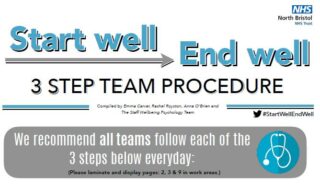Q Exchange
‘Start Well>End Well’ Psychological safety through compassion, connectedness and courage
- Winning idea
- 2020

Meet the team

Vardeep Deogan

Claire Zhang

Jude Clipsom

Lorraine Motuel

Dr Seema Srivastava MBE

Olivia Donnelly

Callum Allen-Ridge
Leonie Williams
Also:
- Dr Reiko Ashida
- Dr Anna O’Brien
- Jessica Bishop
- Wards 25A, 6B and future areas
- Emma Carver
- Dr Rachel Royston
What is the positive change that has emerged through new collaborations or partnerships during Covid-19 that your project is going to embed?
During COVID-19, clinical teams faced disruption, having to respond to challenging circumstances and high uncertainty, whilst providing quality care to patients. We know that staff psychological wellbeing affects team effectiveness and patient experience (Maben, 2012; Paparella, 2015), and resilience is fostered by connections between (not just within) individuals.
New collaborations between clinical, service improvement and psychology teams recognised the value of introducing the psychologically-informed ‘Start Well>End Well’ team procedure into routine team processes. This evidence-based approach consists of 1) an enhanced safety briefing, 2) peer-to-peer debrief guidance and signposting for trauma-focused support, and 3) team check-out.
Initially launched as a general procedure across all wards with variable uptake, a more tailored co-design and coaching approach was then piloted on 2 neurology wards over 3 PDSA cycles. Formative evaluation (focus groups and written feedback) demonstrated staff felt “cared for” whilst achieving “positive impact” through improved ways of working within new teams.
What does your project aim to achieve?
As the healthcare workforce continues to be restructured throughout and beyond the pandemic, the next phase will redesign and rigorously evaluate the procedure alongside scaling up for implementation beyond NBT.
The programme will deliver psychologically-informed support for team wellbeing, psychological safety and effectiveness (Edmondson, 2018), embedded within hands-on coaching enabling the procedure to be tailored to the needs of specific teams. Its objectives are to:
1. Co-design an adaptable version of the ‘Start Well>End Well’ procedure with Q Community & NHS Improvement input
2. Scale up for implementation across clinical and non-clinical settings within and outside of NBT. NHS Improvement is keen to support this approach nationally.
3. Evaluate the impact of this adaptable approach in various clinical and non-clinical settings within and outside of NBT
4. Evaluate its impact on specific staff groups to ensure equitable distribution of wellbeing outcomes (e.g. minority ethnic staff, agency workers, night shift workers)
How will the project be delivered?
The project will be jointly led by the NBT Staff Wellbeing Psychology Team and service improvement teams. NHS Improvement will support resource dissemination and invite other NHS Trusts to participate in evaluation. An Evaluation Lead will assist with evaluation design, primary data collection using validated survey tools and write-up. NBT Business Intelligence will assist with secondary data extraction and analysis.
Intervention-control design will be used in NBT division/directorates for evaluation. A similar approach will be used where possible for teams external to NBT. Team ‘champions’ will collaborate with the NBT team to adapt the procedure, monitor implementation fidelity and manage unintended risks/consequences. Data will be collected pre, during (≥2 PDSA cycles), post, and 3 months post intervention to measure sustainability.
Outcome measures will include staff wellbeing & collaboration (validated questionnaire/interview) and human resource metrics, including cost implications for economic evaluation. Community of practice. Process measures will include experiences of co-design and implementation.
How is your project going to share learning?
Communication channels between the project team and Q Community will flow both ways. We will share the adaptable ‘Start Well>End Well’ resource through the Q Community and NHS Improvement, and host 2 webinars to explore the programme’s alignment with other local and national priorities in order to take the programme beyond NBT and plan for roll-out beyond NBT. We will also use the Q Community as a key network to invite other organisations to participate.
Following implementation and evaluation, findings and learnings from different clinical/non-clinical areas across various Trusts will be shared through Q Exchange project page updates.
The team will write-up the evaluated aspects of the project for publication in peer-reviewed journals (e.g. BMJ Open Quality), submit conference abstracts to national and international conferences (e.g. IHI International Forum), and participate in other Q Exchange virtual events, Special Interest Groups and Twitter.
How you can contribute
- Our team is keen to network within the Q Community to develop our idea, particularly with regards to scaling up the programme for wider implementation outside of our own Trust. We are looking for the following types of contributions:
- The critical friend: We would like your honest feedback to tell us your thoughts about our idea and how we can improve it.
- The networker and promoter: Help us to brainstorm ways that we can promote our idea and reach individuals/organisations in health and social care who may be interested in participating in wider implementation and evaluation.
- The strategist: Assist us to explore what other similar initiatives (local or national) are out there, how it relates to our work, and what we can do to align our project with existing work and priorities
Plan timeline
| 15 Mar 2021 | Webinars and recruitment of external teams |
|---|---|
| 5 Apr 2021 | Finalisation of participants and evaluation plan |
| 12 Apr 2021 | First round of co-design group sessions; Data collection |
| 19 Apr 2021 | PDSA cycle 1 commencement |
| 17 May 2021 | Cycle 1 review, second round co-design group sessions; Data collection |
| 24 May 2021 | PDSA cycle 2 commencement |
| 21 Jun 2021 | Cycle 2 review, third round co-design group sessions; Data collection |
| 20 Sep 2021 | 3 months post-intervention data collection |
| 4 Oct 2021 | Being write-up of evaluation for dissemination |
| 4 Oct 2021 | Share final findings, learnings and resources with Q Community |
| 1 Nov 2021 | Consult and finalise plans for sustainability of ongoing roll-out (Nov-Jan) |
| 24 Jan 2022 | Complete final data analysis and write-up (Jan-Mar) |
| 7 Mar 2022 | Project completion and submission of reports, manuscripts and conference abstracts |
Project updates
11 Apr 2022
Thanks everyone for showing so much interest in the Start Well> End Well Approach. We’re pleased to be able to share with you our end of year project report and project journey.
Its been a busy year, working to understand, share and enable teams to adapt and adopt practices which help promote psychological safety & teaming at North Bristol Trust. Along the way we’ve had lots of questions and discussion which has helped us to develop guidance, editable resources, case studies and training.
As we move forward we are beginning to learn about the people, the time and the situations where it really flourishes, as well as which bits of the approach are easier to establish and what practice and skills need nurturing along the way.
To help us with this, we’d love to know if you’ve used the approach, how you’ve adapted it and how it’s going.
For information on the Start Well> End Well, please reach out and start a conversation. StartWellEndWell@nbt.nhs.uk30 Sep 2021
High Level Project Overview
Following the successful Q Exchange award submission announced in January 2021, the core Start Well, End Well (SWEW) team have established a rhythm of meeting bi-weekly to progress with the project objectives. Our initial aim was to share SWEW both internally within the organisation and nationally, alongside evaluating how it is used and its impact on teams.Although this is still our focus, the core SWEW team have realised two things over the months
- the current context in an acute NHS setting following the height of Covid-19 has impacted our internal implementation strategy, making us realise
- that more time and effort is required on this particular aspect of the project, working at the pace of adopting/interested teams
The spread of SWEW outside the organisation however, has occurred thanks to the Q Community and through the delivery of external webinars.
The core team having taken stock of the situation, has planned a strategy going forwards and have identified both quantitative and qualitative measures that can be used to support the evaluation of both the use and impact of SWEW.
Progress
There are key milestones which mark the progress of the SWEW project and these include:Raising Awareness/Communication of SWEW both internally and externally
- Oct 2020-Jan 2021: Created a short video explaining the purpose of SWEW
- March 2021: Delivering a SWEW webinar with NHS England/Improvement to over 100 attendees followed by our first attempt at a Community of Practice.
- Sept 2021: Delivering an Internal presentation during Bystander week, demonstrating how SWEW fosters psychological safety within teams.
Further Development of Documentation
- July 2021: Finalising the SWEW support package incorporating feedback from early users of the approach. A sharing agreement was also added to the support pack liaising with the legal team in our organisation.
- Oct 2021: Through sharing the support pack it became apparent to the team an additional documentation guiding teams on how to use SWEW was required. This led to the creation and finalisation of an Implementation Guide, which incorporates early learning from its use.
Engaging with teams internally
- Mar 2021: Following the communication and raising awareness of SWEW inside the organisation, Senior leaders in a large Division (Surgery) launched SWEW across a number of clinical areas.
- Aug 2021: Learning that further intensive support was required to support this launch in the Division, the core team designed and delivered 3 SWEW events, with the view to engage early champions of SWEW.
Evaluation Plan
- Firming up a clear evaluation plan for the months ahead, identifying suitable and realistic measures combining both quantitative and qualitative data with a focus on behavioural and attitudinal changes SWEW enables within teams.
What have we learned so far
Through its early use, the core team have had many useful insights that have contributed to our learning; the following are some of the main ones:1. Clinical teams adopting SWEW find that Step 1 (Checking-in) is the easiest as it links to existing routines. This has led to the core team suggesting different ways to facilitate Step 2 (Peer-to-Peer PITSTOP) and Step 3 (Checking out) which includes doing this with individuals or with a smaller number of people in the team.
2. We learnt that teams required resources to help them use SWEW alongside support from the team and this led to the creation of the Implementation Guide which is a comprehensive piece of documentation including early case studies and a section on Top Tips.
3. We have realised we need to focus on working closely with a smaller number of teams, using a coaching and appreciative inquiry approach to support them using SWEW. This in turn will allow us to collate more robust data to evaluate its use.
4. Using the expertise of the Clinical Psychologists in the core team, PITSTOP training has been developed.
What could others learn from your experience of working with a range of stakeholders
1. Early adopters need a lot of support, we have realised this now. This takes time and is important when considering the project plan
2. It is important to identify who the Executive stakeholders are within the organisation. Our organisation has had a lot of change over the last few months and we have lost sight of this slightly, having realised this now we have outlined a plan to engage with this category of stakeholders.
What are the next steps for your project over the coming months?
Data/Measurement- We have now identified the different types of data we will use to evaluate the SWEW approach and over the coming months we will collate the quantitative data, to identify trends/patterns and we will also focus on collecting qualitative data to help us build case studies. Combined, this information will help us understand how SWEW supports teams foster psychological safety, team working and well-being.Sustainability- We will be looking at ways we can make the SWEW resources we have created more accessible internally and to guide teams to collect information following its use, to evaluate the impact of using the SWEW approach.
The SWEW core team are planning to regroup, identify the project needs for the coming months, to then further shape team/individual roles and responsibilities.
We would like to lay the foundations to build a SWEW Community of Practice within the organisation and amongst the early adopters. This is a new concept in our organisation and will therefore require some focused attention.
We will continue to share our SWEW journey internally, with the view to engage and establish Executive level sponsorship and externally to build a wider SWEW Community in Health and Care.
How can the community get involved in your project?
We have been very grateful with members who have engaged and shown great interest in our project and would like this to continue:We would like to hear and learn from other members of the Q Community who are also measuring the impact of initiatives that also look to foster psychological safety in the NHS.
We would like those using SWEW, to continue to provide us with feedback to help us understand how, when and why SWEW works and/or does not work, as an approach.
To suggest where else we can share our SWEW Journey.
Comments
Sebastian Kraemer 23 Mar 2021
Peer engagment in health and care is an idea whose time has come: http://bmj.com/cgi/content/full/bmj.m3102?ijkey=2YCt6XtCsHi9wKO&keytype=ref
The key is to ensure that all points of view are equally respected. Group process tends to favour the most articulate and confident, but it is the less audible voices that can supply the missing pieces of the jigsaw.
In this way colleagues learn from each other. This is more than staff support, it is staff professional development.
Without a facilitator it is much harder to achieve and maintain the fuller picture, always "other than the sum of the parts".
www.sebastiankraemer.com
Katie Lean 15 Feb 2021
Thanks for sharing this. I work at the Oxford AHSN as a senior workforce programme manager and having evaluated staff health and wellbeing recently - this looks like a great introduction to any team. I think the importance of it for non-clinical teams is also vital as their role is critical to the clinical arena. Happy to link with you and our ICS.
Suzette Woodward 4 Feb 2021
Love this - would be happy to be a critical friend
Rachel Trask 28 Jan 2021
What a brilliant idea and one that melds well with our Psychology 4 Improvement Q Exchange 2019 project. I would love to learn more and see how this develops in the future.
Melanie Newton 25 Jan 2021
Dear all, This looks fabulous, I am in the final year of my Doc Professional Practice study looking at psychological safety for RNs and would love to either be involved or have access to your work
Kind regards
Mel
Sue Deakin 23 Jan 2021
Victoria Handford 25 Jan 2021
Dear Sue,
Thank you very much for your kind comments. If you email me at StartWellEndWell@nbt.nhs.uk, with your NHS contact details, then I can send you a copy of our implementation pack.
Victoria Handford 25 Jan 2021
Hi Sue,
Thank you very much for your positive comments. If you email me at StartWellEndWell@nbt.nhs.uk then I can share our implementation pack with you and details of a webinar that we are intending to run with NHS E&I in early March.
Lorna Stewart 20 Oct 2020
Hi team, I really like this idea and the process that you've been developing; it looks like you've already had some great team engagement. We'd be keen to learn from each other. Check out our bid as well at: https://q.health.org.uk/idea/2020/enhancing-psychological-ppe
Vardeep Deogan 15 Oct 2020
Hi Pete, Thank you for your reflections, support and feedback. You prompted a few discussions within the team and helped us clarify a few things. In particular we discussed how passionate we are that teams take the Start Well >End Well framework and adapt accordingly to their needs and environment. As you suggested, we have since looked at other projects related to the same theme with the view to see how this tool could compliment existing services specialising in this.
Peter Dudgeon 30 Sep 2020
Hi Vardeep,
Myself and Emma Adams are supporting the Health Foundation this year by fostering conversations between Q members and encouraging collaboration. We were Exchange applicants last year, so we’re hoping that our experience will help us to help others, as their ideas take shape.
Your idea is highly compelling, well-articulated and good example of COVID-related innovation. You might have seen that there are a number of ideas describing efforts to improve staff wellbeing. I've been reading through these and thought it would be helpful to highlight in particular the project, 'Supporting staff with prompt, easily accessible psychological and wellbeing support.' Whilst the support they are offering has as delivery model to the one you are proposing, I believe that it may be helpful to connect with them (perhaps commenting on their idea and vice versa), conscious that - for instance - you are looking for others to play a critical friend role.
If I can help foster other connections over time, I will. In the meantime I wish you all the best with your idea.
Pete
Comments are now closed for this post.